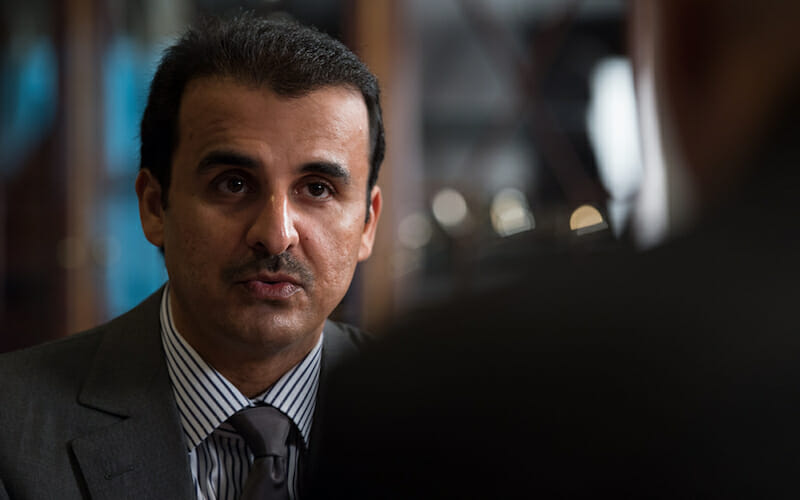
Doha Seems to be Closer to Washington than 10 Months Ago
In early April, President Trump hosted Emir Tamim Bin Hamad Al Thani of Qatar in the Oval Office. Just weeks after Trump’s meeting with the powerful Crown Prince of Saudi Arabia Mohamed bin Salman.
In June 2017, when the Saudi led coalition imposed a blockade on Qatar, Trump publicly sided with the Saudis, and accused Qatar of a long history of “funding terrorists,” describing the blockade as a “hard but necessary action.” Trump’s stance contradicts the US State and Defence Department positions on the GCC dispute, which calls for “calming the situation” and supporting Kuwait’s efforts to mediate between Qatar and Saudi Arabia, the UAE, Bahrain and Egypt.
However, after long discussions in Washington foreign policy circles, Trump agreed with the Pentagon and the State Department and announced during a joint press conference with the Emir of Kuwait that he is willing to offer meditation to solve the dispute. Trump also met with Emir Tamim during the sidelines of the UN General Assembly last year to discuss regional issues and the GCC crisis.
The White House also invited leaders from Saudi Arabia, the United Arab Emirates and Qatar to discuss the crisis, ahead of a GCC summit that the US was planning to host in May. The Emirati Crown Prince Mohamed Bin Zayed Al Nahyan rescheduled his trip. Some describe the UAE Crown Prince as the chief architect of the Qatari blockade, and the main reason he delayed his trip is to have the final word on the discussion about the way forward for the GCC.
Sources in Washington suggested recently that the summit has been postponed due to a busy foreign policy programme in Washington, the lack of consensus within some GCC members and the vacancy of a chief US diplomat, who is waiting to be confirmed by the US senate. There is a high probability that the crisis is turning into permanent crisis, as Kristian Ulrichsen has argued.
Analysts agree that Trump is the only leader that has a leverage to solve the crisis for several reasons. First. Many argue that Trump’s speech in Riyadh during his first trip in Saudi Arabia emboldened the GCC nations to point to Qatar as a state sponsor of terror. So if he is now acting as a mediator, he can ask the parties to de-escalate the tension and cooperate on issues like eliminating terror financing and counter-terrorism. Second. As the US is the main security guarantor of several of these countries, Trump can pressure the different sides of the conflict to come to the negotiation table and find a solution.
As Trump shifted his position from siding with Saudi Arabia and the UAE to playing a mediating role in solving the GCC row, it is worth mentioning the reasons behind Trump’s complete shift.
Iran
The multilateral nuclear agreement, between Iran and China, France, Russia, United Kingdom, the United States—plus Germany, known as the Joint Comprehensive Plan of Action was criticized by Trump as the “worst deal the US ever entered” and one of the reasons he fired Rex Tillerson, his secretary of state.
In October 2017, Trump decertified the deal and presented his policy towards Iran. The aim of this new strategy is to contain Iran’s influence in the region. In January 2018, Trump did not waiver the sanctions but asked his European allies (Britain, France and Germany) to present a new deal before May 12 or the US would withdraw from the deal. Trump is set to host French President Emmanuel Macron and German Chancellor Angela Merkel, in order to discuss a number of issues including their new proposal for the JCPOA.
Beyond the nuclear threat, the US argues that Iran poses four other threats to US interests in the region and the security of US allies in the Middle East. These include cyber threats, support of terrorist organizations, maritime threats, and the Iranian ballistic missiles program. The Gulf Cooperation Council was established as a regional bloc after the Islamic Revolution took power and one of its main objectives is to present a united front against Iran. It is in the interest of the US to work alongside its GCC allies to counter Iran, as the US sees Iran as a threat and resolving the conflict is crucial for US interests.
Counter terrorism
During his press briefing before his White House meeting, Emir Tamim described Qatar as the ‘heart’ of US counter-terrorism efforts in the Middle East. Meanwhile, Trump praised Qatar for its efforts in cutting funding to terrorist groups. Qatar hosts the US largest military airbase in the Middle East, known as Al-Udeid, which the US uses to conduct operations against remnants of Islamic State and other terrorist groups. Qatar has signed a major memorandum of understanding on terror financing with the United States and launched a counterterrorism dialogue with Washington, the only country in the Persian Gulf to have done so.
Trade and investment
Before Tamim’s trip to Washington, Qatari’s top economic and business leaders were visiting the east coast of the US to promote economic and investment ties in Florida, North Carolina, and South Carolina as Bryant Harris reported. In addition, Qatar’s Tamim discussed Qatari investment in the US several times during his trip, including his meeting with Trump. The economic partnership between the US and Qatar is valued at more than $120 billion and Emir Tamim announced that he is seeking to double this partnership in the coming years. Beyond economic relations, the US is an important supplier of arms to Qatar.
As the US and China are in a middle of a trade dispute in what some describe as a trade war, due to the “lack of fair and reciprocal trade” as Trump argues, US Treasury Secretary Steve Mnuchin has said that the US maintains a trade surplus with Qatar.
Since Qatar faced the blockade 10 months ago, Qatar responded by diversifying its relations with other countries, and Emir Tamim made official trips to Europe, Africa, Asia and the US to send a clear message to Riyadh and Abu Dubai. ‘You may hit us by cutting ties with our countries, but you can’t isolate Qatar from the world stage.’
While the recent Washington trip did not produce major achievements, Qatar’s main goal is to foster close relations with the US, while conducting an independent foreign policy from Saudi Arabia. Qatar and the US announced in January a high-level strategic dialogue that involves the ministers of defence and foreign affairs of the two countries.
The recent rise of neoconservatives in Washington’s foreign policy establishment, with John Bolton as the National Security Advisor and Mike Pompeo as the Secretary of State demonstrated that both the Saudis and the Emirates have the upper hand due to their hawkishness towards Iran and the Muslim Brotherhood, a Islamist group that is close to Qatar. Nevertheless, Trump’s recent phone call with King Salman of Saudi Arabia shows that Trump is committed to solving the GCC dispute, describing the whole crisis as a “non-sense” as Reuters reported.

